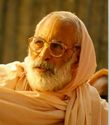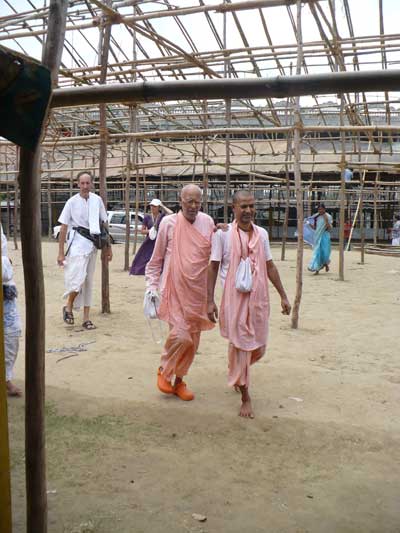

After the successful completion of the Navadvipa-dhama parikrama and Gaura-purnima celebration, an Advisory Board Meeting was held at Srila Narayan Gosvami Maharaja’s request. By the will of the Lord, of the one-hundred devotees present, only half of them were members of the Advisory Board. Still, all the devotees present were valuable contributors. And actually, the meeting was more of a communications skills workshop than a management directors’ meeting.
The meeting was held in front of the small, former temple room at Sri Kesavaji Gaudiya Matha. The purpose of this meeting was to further unite the members of his international society, in order to make it a more powerful spiritual force for spreading Krsna consciousness around the world.
The meeting was led by Dilip Sahajpal (Global CEO, Board level Leadership, and management consultant). A long-time friend of Sriman Yasodanandana dasa and co-director of Srila Narayana Maharaja’s business in the UK, Dilip had also conducted the Advisory Board meeting which took place in Vrndavana just before Kartika last year. There, he had been instrumental in inspiring an increase of open, heartfelt communication among the members present.
The meeting in Navadvipa took place over a three-day period, and on the second day Srila Narayan Maharaja personally attended for a short while. Srila Maharaja first asked Yasodanandana dasa (co-facilitator of the meeting, and member of Srila Narayan Maharaja’s Bhakti Trust International) how the meetings were progressing. The following is a transcription of his discussion with Yasodanandana dasa and the other devotees present.
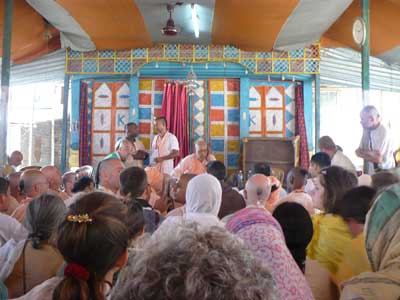
[Yasodanandana dasa:] “At some points, Gurudeva, it was difficult, but now I think we have reached some very good conclusions.”
[Srila Narayan Gosvami Maharaja:] “Are all sannyasis here? Indian and Western?”
[Brajanath dasa:] “Not all.”
[Srila Narayan Gosvami Maharaja:] “Not all, but mostly?”
[Brajanath dasa:] “Mostly the Western sannyasis are here.”
[Yasodanandana dasa:] “Would you like me to summarize what took place so far?”
[Srila Narayan Gosvami Maharaja:] “It will be best that you finish the meeting, and then I will return here. At that time you can tell me everything in brief. Now I am going to see Thakurji, and you should continue.
“(To all devotees) You are satisfied?”
[Srila Maharaja called for Ramacandra, who began to explain the beginning of the discussions regarding the formation of a sannyasi council.]
[Srila Narayan Gosvami Maharaja:] “Five or six or seven sannyasis and other preachers go to a place at the same time, and this creates a burden for the local devotees of that place. So first they should discuss among themselves, and then decide who will go where and when they will go.
“So you should continue your meeting, and finish tomorrow. I am leaving at about three or four o’clock in the afternoon, so I may come in the morning at about ten. Try to finish by then. You should begin earlier, from eight o’clock.
“(Turning to all devotees) I think you should all tell your ideas openly and bravely; don’t fear from anyone. You all have a right to express your ideas. Do not think, “Oh, only they are controlling.”
[Sripad Vana Maharaja:] “There is a question about taking Syamarani didi in the sannyasa council. Some are saying yes, others are saying no.”
[Srila Narayan Gosvami Maharaja:] “Do not worry about that. She is ‘sannyasini’.”
[Sripad Ramachandra dasa:] “Gurudeva, the concern is that (in the sannyasa council), the sannyasis are going to monitor the sannyasis’ behaviour (character). So, if there is a lady in the council it will be difficult. It’s better that only men are in the council.”
[Srila Narayan Gosvami Maharaja:] “But you can take her views; suggestions.
“OK, so you should continue.
”Gopinatha prabhu, is everything going on well?”
[Gopinatha dasa:] “Very well, Gurudeva.”
[Ramacandra dasa:] “We heard at the beginning of the meeting this morning, before you arrived, that you said the voting should be ‘anonymous’. What do you mean by that? Perhaps you really meant ‘unanimous’?”
[Srila Narayan Gosvami Maharaja:] “It means ‘by majority’. Your votes should be by majority, and two/thirds vote is better. In this way you should decide everything.
“Sannyasis and preachers should not give pressure to anyone. They should not say to others, “I am coming to your area, so you should give me my ‘coming and going’ fare.” They should not press. Do you understand? Others may give, but of their own accord. Also, you should know that Van Maharaja and Sajjana Maharaja are giving me everything they receive as pranami (donations), lakhs of rupees, from their preaching. I want that all the sannyasis help me with my projects. Try to do this.”
[Srila Narayana Gosvami Maharaja:] “What have you decided?”
[Yasodanandana dasa:] “The summary is as follows, Gurudeva: You requested that you want cooperation, preaching, no quarreling, taking responsibility, respecting each other, and relating with love and affection to all; and you want results. The framework that we used was ‘love and affection as a foundation-stone through relationships. We discussed taking 100% responsibility, both individually and working in teams interdependently. We also discussed that there would be some working principles so that we understand how to manage.’
“We decided to evolve together with ‘love and affection, through responsibility and effective action.’ We realize that we need to build much more trust. There is not enough trust between us. We will do this through practical cooperation.
“We discussed tangible things, Gurudeva, like when we form seva groups we should do so in a disciplined manner. For example, there would be three to five devotees in a team, not nine or ten or fifteen. In order to decide who is on a team if there are too many volunteers, there would be a vote. Also, we discussed publishing the existence of the seva teams on the internet. In this way, everybody would know of the teams’ existence, their members, and their purpose.
“We also talked about the clear process of making decisions. We have no desire to quarrel, so there needs to be a clear process of making decisions. Groups would first of all define the question they want to decide on, and then set a timeline for making that decision. A unanimous decision is best, or, if not, then a two-thirds vote; and if not, then a majority vote.
“Then we came to an important principle. If a devotee is on a seva-team and the majority vote goes against his opinion, that devotee will still work with the group, as though the vote was for his opinion. There would be no selfishness in the group. We work for the team.
“We already had a practical example of this. We applied this principle, in action, with the newly formed sannyasi council seva group. I’m going to hand the mike to Sripad Vaikhanas Maharaja. He will explain what they did.”
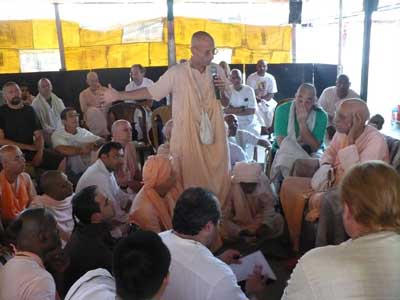
[Sripad Vaikhanas Maharaja:] “The purpose of the sannyasi group is to create a greater sense of cooperation and relationship between all the sannyasis, both Western and Indian. Another purpose is to responsibly assist in the preaching world-wide, and to coordinate the preaching much more effectively.
“The sannyasi group itself, which is meant to communicate and coordinate the activities of all the sannyasis, consists of Sripad Madhava Maharaja, Sripad Tirtha Maharaja, Sripad Van Maharaja, Sripad Padmanabha Maharaja, and myself.
“From the larger sannyasi group, Sripad Padmanabha Maharaja, Sripad Bhagavat Maharaja, and Sripad Tridandi Maharaja will be three of the members of a new preachers’ board, which will also include those who are not sannyasis. This board will work cooperatively with preachers from the entire sanga, to organize, coordinate, and promote preaching throughout the world.
“For that purpose, a seva group (called SRI – Seva Resources Initiative) has been founded for facilitation, education, communication, and inspiration. They have a website, which will be launched soon, and the first report of this seva team will be given in Badger.”
[Yasodanandana dasa:] “Finally, there will be a website to give the tools for management. This will help the seva teams with their organizing. We will keep this website updated.”
Srila Narayana Gosvami Maharaja then inquired whether the name of his new Society has been decided yet. There was much discussion, at the end of which Yasodanandana dasa promised that the name will be decided and presented to him for approval by April. 30.
[Yasodanandana dasa and Brajanath dasa:] “Gurudeva, whatever proposal or decision we make, whether it is by unanimous vote, or two-thirds, or by majority, we will not do anything without your approval.”
[Srila Narayan Gosvami Maharaja:] “There needs to be some corrections in the temple room (natya-mandira) construction. Also, domes will be constructed, the guest rooms will extend further, and my bhajana kutir will be made. In this way, I think we can complete the temple this year – by the next Navadvipa parikrama. I want that.”
[Sripad Bhagavat Maharaja:] “How much is needed to complete the project?”
[Srila Narayan Gosvami Maharaja:] “Gopinath will give the conclusion.”
[Gopinatha dasa:] “To complete the whole project we actually need two million dollars.”
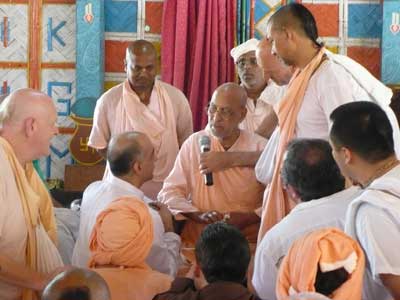
[Srila Narayana Gosvami Maharaja (to Dilip):] “You will have to help us. Each year, if there is any need, you should come and help. But I should also help you. I want your eternal well-being. I want that you will be happy in this world and in the transcendental world.”
Srila Maharaja then lovingly requested Dilip to prepare for accepting harinama and diksa. After this he left the meeting, accompanied by kirtana and feelings of imminent separation, now that he would be departing for Silagori.
After his departure, some of the devotees continued with the final part of the Advisory Board meeting. At that smaller meeting, Dilip and Yasodanandana dasa met with the devotees from many countries around the world who are involved in publishing Srila Maharaja’s books in different languages. During that meeting, a publication board was selected to assist all the international publishing teams in developing increased unity and a higher standard of excellence. The devotees on that publication board are Sripad Sagara Maharaja, Sundara-gopal dasa, Anita dasi, and Savitri dasi.
Many wonderful things happened at the three-day meeting. For example, the facilitators encouraged all the devotees present to speak their heartfelt feelings. Moreover, they encouraged all to hear when devotees would speak their feelings. Newer and younger and lady devotees were called upon to speak. These devotees were able to give their sincere advice to the sannyasis and other senior devotees. All the devotees present appreciated that openness. Especially, the sannyasis who were advised by these younger devotees appreciated their comments, and took them to heart.
It is not the purpose of this report to review all the points of the meeting, because this is a Harikatha report. We are therefore presenting only the parts of the meeting where Srila Narayan Maharaja was present and participated. The purpose of the report is so that all our readers will feel included. It is to encourage our respected readers that:
1. Srila Narayan Maharaja, desiring a strong, unified, harmonious society, is giving his full support to this meeting.
2. The devotees assisting with the organization work are working under Srila Maharaja's guidance and authorization.
3. Srila Maharaja wants to give all his sons and daughters equal opportunity for full participation and voice.
[*Endnote by Sripad Madhava Maharaja, explaining the reason we are now addressing Srila Narayan Maharaja and ‘Srila Narayan Gosvami Maharaja in our various publications: “According to the first verse of Sri Updesamrta, and according to the continuous activities shown by our Six Gosvamis - writing books on pure bhakti, establishing Sri Vigraha (the Deity form of the Lord), discovering and establishing the holy places of Sri Krsna's pastimes, and establishing ideal Vaisnava etiquette – the acaryas in our guru-parampara line (coming from Srila Rupa Gosvami) are ornamented with the title ‘Gosvami’. Nowadays this title is used in an ordinary or worldly sense by the family-line descendents of the Six Gosvamis. But actually, this title belongs to those who represent the authentic line of the teachings of our Six Gosvamis in the transcendental realm.”
Quotes on “Gosvami” from Srila Prabhupada Bhaktivedanta Swami Maharaja:
(From a letter to Satsvarupa, Montreal, 3 July 1968) “Really, Gosvami means one who is master of the influence of different senses, namely the influence of tongue, the influence of mind, the influence of anger, the influence of belly, the influence of genital, and the influence of talking. So one who is master of these influential webs of sense gratification, he is called Gosvami. Gosvami is not by hereditary chart.”
(From the book, Path of Perfection) “Unless one masters the senses, his acceptance of the title Svami or Gosvami is just a form of cheating. It was Rupa Gosvami who thus defined the meaning of the word Gosvami….One becomes so qualified under the directions of a bona fide spiritual master. Only when one has attained perfection in sense control can he be called a Gosvami and become a spiritual master in his turn. Unless one can master the senses, he will simply be a bogus spiritual master.”
(From Sri Upadesamrta (1) "A sober person who can tolerate the urge to speak, the mind's demands, the actions of anger, and the urges of the tongue, belly, and genitals is qualified to make disciples all over the world."
(Excerpts from Sri Sad Goswami Astaka, by Srinivasa Acarya) “They are not envious of anyone. Thus they are engaged in missionary activities meant to deliver all the conditioned souls in the material universe….They are very expert in scrutinizingly studying all the revealed scriptures with the aim of establishing eternal religious principles for the benefit of all human beings….They are very much enriched in understanding of Lord Caitanya and who are thus expert in narrating His transcendental qualities….They kicked off all association of aristocracy as insignificant. In order to deliver the poor conditioned souls, they accepted loincloths, treating themselves as mendicants….They were always meek and humble enchanted by remembering the transcendental qualities of the Lord.”]
Editorial Advisors: Pujyapad Madhava Maharaja, Sripad Brajanath dasa, Sri Prema Prayojana dasa, Sripad Yasodanandana dasa
Assistant Editor: Hariballabha dasi
Editor: Syamarani dasi
Translation Assistance: Sripad Visnu Dasa
Proofreader: Krsna-kamini dasi
Report written by: Vasanti dasi
HTML: Bhutabhavana dasa
![[BVML Home Page]](../../grfx/bml_logo.gif)
